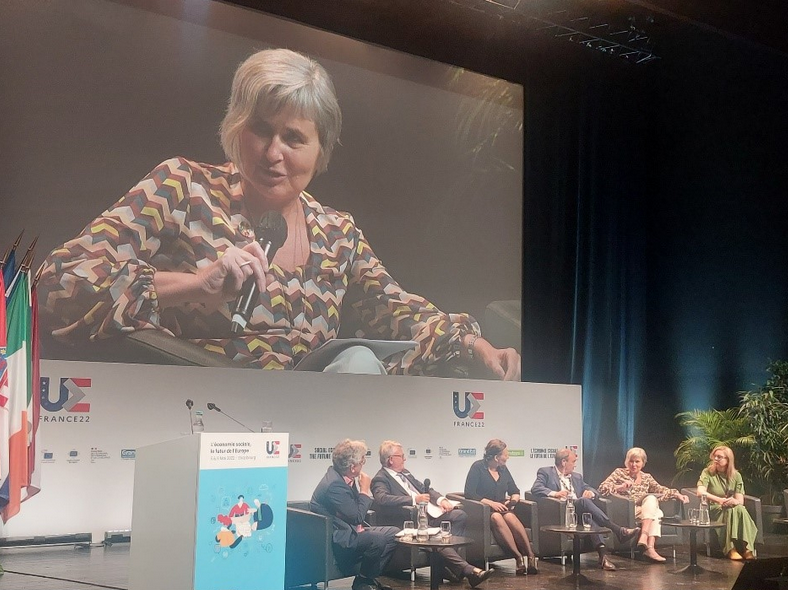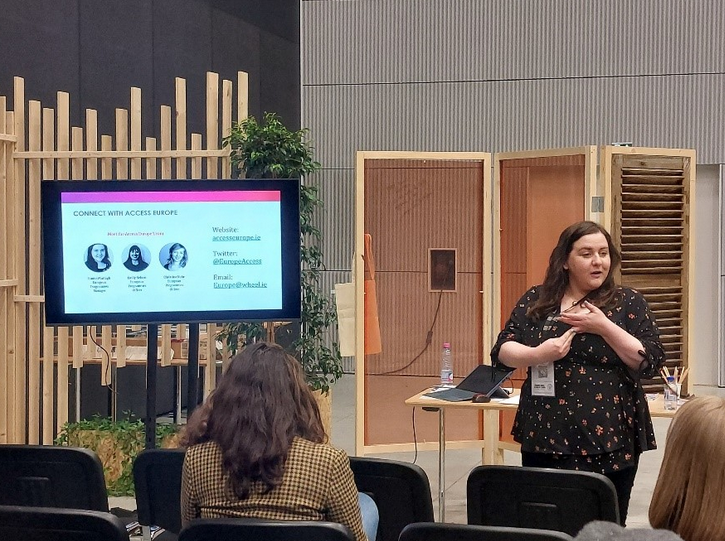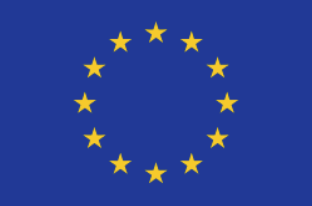Social Economy, the Future of Europe
The Social Economy, the Future of Europe conference took place in Strasbourg on 5 and 6 May and we were honoured that our CEO, Deirdre Garvey was invited to speak on a panel and represent Ireland’s social economy.
This major event was organised by the French Presidency of the Council of the EU and mobilised more than 1,000 Europeans to discuss the recently published Social Economy Action Plan and to shape the future of the EU.
Deirdre participated in one of the main panels on the first day of the conference alongside Nicolas Schmit, European Commissioner for Jobs and Social Rights; Juan Antonio Pedreño, President of Social Economy Europe (SEE); and other social economy representatives from Sweden and Romania. The session illustrated how the Action Plan can support the development of the social economy in concrete terms and how social economy representative networks can help.
Deirdre noted some key points on the panel discussion while representing the Irish social economy:
-
We must have an inclusive understanding of social economy that recognises all its forms
-
The social economy plays an integral role in the overall economy
-
We must strive for socially responsible & green public procurement
When asked how we will use the Social Economy Action Plan in Ireland, The Wheel committed to:
-
Publishing our own strategy interpreting its recommendations for Ireland
-
Using it to inform our skills & policy programmes
-
Engaging our members about how they can use #SEAP in their work
Pictured below is Deirdre speaking on the Social Economy Action Plan panel.

“The launch of the Social Economy Action Plan is a turning point in Europe. It recognises that in order to overcome so many of the major global challenges we face, we must invest in an economy that works better for people and the planet. I was delighted to represent Irish social economy at this important conference and to ensure that the views and needs of the sector are represented at EU level so that together, we can make the ambitions of the Action Plan a reality.” - Deirdre
Our European Programmes Manager, Emma Murtagh, also attended the conference and delivered an engaging workshop on EU partnership development. Emma presented a step-by-step process to creating a network of EU partners, and used the opportunity to promote Access Europe Partner Database, which showcases Irish civil society organisations to potential EU partners. You can learn more about the database here.

“Partnership with other countries is one of the core components of many EU funding programmes. Oftentimes, people see if as a barrier to overcome, but when done right, it can be an incredible opportunity to learn, share, and tap into new skills and sources of funding. Access Europe is here to help Irish organisations find EU partners so get in touch with us if you want to find out more.” - Emma
At EU level, the social economy is a vital part of the overall economy, representing 10% of all businesses in the EU and employing 11 million people. It is an integral part of several key EU policies, such as a just green and digital transition, the European pillar of social rights, and the EU cohesion policy
Through implementing the Social Economy Action Plan, social enterprises will have a greater understanding of and access to EU funded programmes. Social enterprises can benefit from a variety of European funding and support programmes such as the European structural funds, Horizon Europe, the Digital Europe Programme, EU4Health or the LIFE programme.
To learn more about the EU policy on social economy, watch the helpful explainer video below. You can also reach out to Access Europe at europe@wheel.ie with any questions. Visit the Access Europe website for more information and follow us on Twitter and Facebook.
This blog and our video series are brought to you by the project EU Engage which is funded by the European Union. The contents of these publications are the sole responsibility of The Wheel and do not necessarily reflect the opinion of the European Union.

